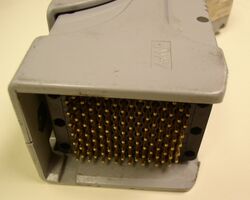Difference between revisions of "PDP-10 Memory Bus"
(Make into separate page) |
m (→See also: +PDP-10 I/O Bus) |
||
| Line 16: | Line 16: | ||
On the KI10, and KL10s with an external memory bus, the memory bus cables ended in a large QuickLatch connector; these connectors were also used on the CPU end of I/O bus cables of those machines. | On the KI10, and KL10s with an external memory bus, the memory bus cables ended in a large QuickLatch connector; these connectors were also used on the CPU end of I/O bus cables of those machines. | ||
| + | |||
| + | ==See also== | ||
| + | |||
| + | * [[PDP-10 I/O Bus]] | ||
==External links== | ==External links== | ||
Revision as of 01:25, 23 October 2022
The PDP-10 Memory Bus, the main memory bus of the PDP-10, existed in three generations. (There were likewise three generations of memory systems to attach to them.)
The first two were the so-called 'external memory bus', in KA (18-bit address) and KI (22-bit) forms (for the KA10, and KI10 and early KL10, respectively), although they also had minor protocol differences.
The last was the 'internal memory bus', the S-Bus. (For the later KL10s, a later version of the S-Bus, the X-Bus, differed only in the logic family it interfaced to).
The differences between the two external bus types required a KI10-M Memory Bus Adapter if KA-type units were to be attached to a KI10. Similarly, KI-type units could be attached to the S-Bus using a DMA20 Memory Bus Adapter.
For DMA, mass storage peripherals connected directly to memories (PDP-10 memories are generally multi-port).
Physical form
On the KA10, all the busses were physically instantiated as cables with a pair of dual width PCBs at each end, which plugged into slots in a standard DEC backplane; these later became the CJ connectors.
On the KI10, and KL10s with an external memory bus, the memory bus cables ended in a large QuickLatch connector; these connectors were also used on the CPU end of I/O bus cables of those machines.
See also
External links
- EK-108OU-PD-002, "KL10-Based Physical Description" - has images of CJ dual card connectors and QuickLatch connectors, pp. 69-70
